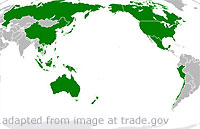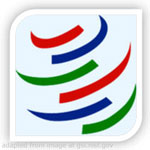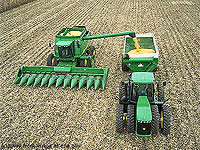Transit Across Russia Key APEC Theme
Howard Amos - Moscow Times - themoscowtimes.com - 8.24.12 - JRL 2012-153
Business leaders are hoping to use the upcoming Asia-Pacific Economic Cooperation summit in Vladivostok as a catalyst to increase Russia's importance as a transit nation, which could generate $600 billion for APEC economies over the coming decade.

Cultivating economic and political ties with countries bordering Russia's Far East and committing to a program of internal investment will eliminate bottlenecks currently restricting use of the Trans-Siberian rail route, Maxim Golovinov, leading project manager at the APEC National Business Center, told reporters in Moscow on Thursday.
"The Russian strategy is, of course, to turn itself into a bridge between Europe and Asia," he said.
The APEC National Business Center is a noncommercial body that represents the interests of Russian business to APEC. Only some of the country's top companies are members, but they include oil pipeline monopoly Transneft, VTB Bank, infrastructure investor Summa Group, billionaire Oleg Deripaska's Basic Element and the Skolkovo Foundation.
Boosting the use of Russian infrastructure is one of its priorities.
The overland route through Siberia from Europe to Asia is three times quicker than the sea route via the Suez Canal, said APEC National Business Center chairman Vladimir Andrusik, and "the southern sea route is overloaded."
According to research released by PriceWaterhouseCoopers on Thursday, trade between APEC countries is set to almost triple from $5.7 billion last year to $14.6 billion in 2021.
A $20 billion investment program in the infrastructure of west-to-east transport corridors would help Russia take advantage of this growth and generate about $600 billion for the Asia-Pacific region's economy through 2020, Andrusik said.
If such a program were carried out, the volume of cargo being transported across Russia could also increase fivefold by 2020, Golovinov said. Shipping companies running cargoes through Russia's Arctic northeast passage could also benefit, he said.
The key factor underpinning growth, however, will be the level of internal investment in infrastructure networks.
"The Russian Federation is in an ideal geographical position as a corridor between East and West, [but] it is not able to fulfill its potential because of logistical restrictions," said Oleg Danilin, a partner at Ernst & Young.
But while business leaders and top officials will be discussing infrastructure development during the summit in Vladivostok between Sept. 2 and Sept. 9, they will be creating transportation problems for local residents.
Fuel rationing will be introduced in Vladivostok during the APEC gathering to protect conference delegates from local traffic congestion, according to media reports.
Keywords: Russia, Economy, Business, Investment, Trade - Russia, Far East, APEC - Russian News - Russia - Johnson's Russia List
Now that it's part of the WTO, the Russian government will move to knock down trade barriers on exports, an Economic Development Ministry official said Thursday.

The ministry has a "blacklist" of Russia's trade partners that restrict imports from the country and will seek to remove any unfair constraints, Yekaterina Mayorova, deputy director of the Economic Development Ministry's department of trade negotiations, said at a news conference.
She spoke a day after Russia joined the Word Trade Organization, which serves as a global trade arbiter.
The ministry has estimated that Russian companies lost up to $2 billion annually in potential sales thanks to those restrictions. It counted 72 protective measures chiefly antidumping import duties and tariff quotas against Russian goods in a report released in April.

file photo
"We do have a sort of a blacklist of our trade partners that apply against us various restrictions and discriminatory measures that don't comply with WTO rules," she said. "These measures vary on how painful they are for our producers, and we will no doubt fight them."
The ministry will consult the domestic producers about where the government must act first, she said.
Mayorova named steelmakers, chemical producers and agricultural firms as the companies that suffer most from other countries' trade barriers.
In a case where Russia's pending WTO entry served as a catalyst for removing a years-long trade impediment, an association of grain growers said Thursday that it was about to open China's market for exports.
"We have a certain breakthrough in relations with China," Pavel Skurikhin, president of the Grain Growers Union, said at the same news conference.
Russia and China agreed in May on a memorandum of understanding to align their phytosanitary rules, which govern the safety of farming produce, he said.
The differences in the rules have long prevented Russian grain sales in China, but talks to iron out the hurdle moved ahead quickly after December, when the WTO invited Russia to join. The memorandum is based on WTO rules, Skurikhin said.
"This was perhaps the first positive example of the new reality nearly being a WTO member," he said.
The government expects to sign the final agreement by the end of this year, he said on the sidelines of the news conference. Russia could start grain sales to China next year, he said.
Annual shipments could reach at least 1 million tons and go through the Black Sea port of Novorossiisk, he said.
In another opening opportunity, Skurikhin said farmers could grow more soybeans in the Far East for sales to China and Southeast Asia. The reason is that under its WTO commitments, Russia has to gradually lower its soybean export duty to 7.5 percent from 20 percent, he said.
"I think it's quite a good and serious signal for an increase of soybean production in the country," he said.
WTO membership could also disrupt efforts by some business groups to protect the domestic market from foreign competition.
Yevgeny Korchevoy, director of the Association of Farming Equipment Producers, reiterated Thursday that other WTO members could dispute any future measures by the Eurasian Economic Commission, instigated by the association, to hamper the import of harvesters.
The harvesters come chiefly from John Deere and Case New Holland, said Andrei Agashkov, a spokesman for the association.
The Eurasian Economic Commission, a governing agency of the customs union of Russia, Belarus and Kazakhstan, announced earlier this month that it had started looking into a complaint by Russian harvesters producer Rostselmash, which said the increase of imports of competing brands was suspiciously strong despite the fact that they are more expensive.
Agashkov said the industry wanted the import duties on this type of equipment to increase again, after they went down to 5 percent from 15 percent with Russia's accession to the WTO.
Such an investigation can last up to nine months, a Eurasian Economic Commission spokesman said.
Calls to John Deere spokespeople went unanswered Thursday evening. Case New Holland's press unit for Europe didn't respond to an e-mail Thursday evening requesting comment.